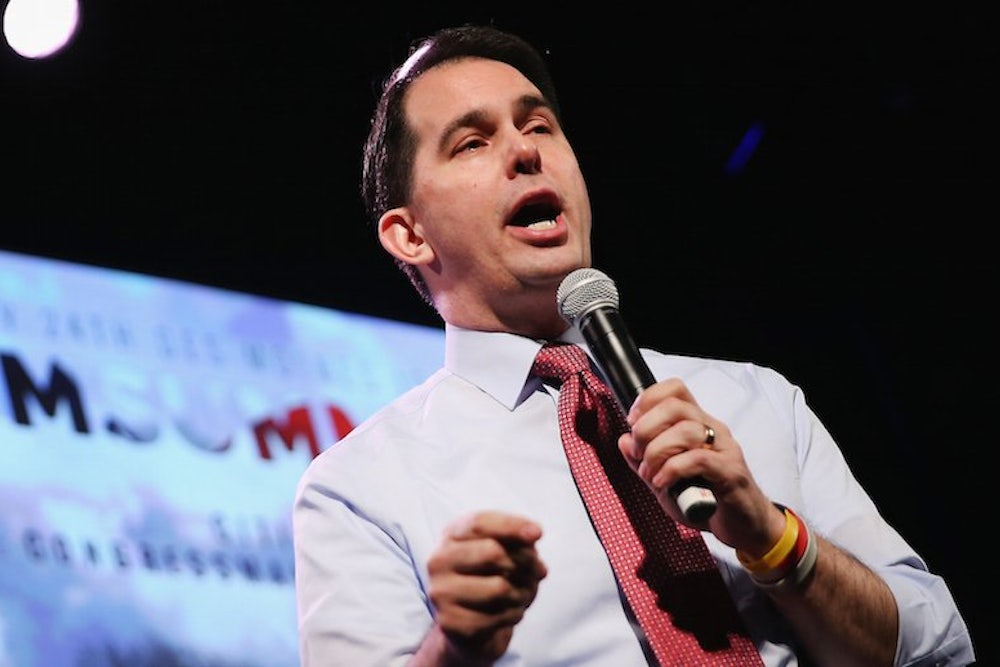If Ted Cruz or Marco Rubio or any other charismatic Republican had turned in a performance like this—a forceful if not quite stemwinding speech at the conservative "Freedom Summit" in Iowa this weekend—it would’ve gone unnoticed. But for Governor Scott Walker it has changed everything.
On paper, Walker ought to be the clear Republican favorite going into 2016. He fuses the typically incompatible demands of the GOP's donor class with those of its primary voters, who tend to be suspicious of northern governors. But Walker has established his managerial bona fides by governing Wisconsin—a reliably liberal state—as a battle-ready conservative, and in so doing has won major legislative victories and (essentially) two re-election campaigns.
But he’s also the kind of person who radiates this degree of excitement.
Just got a haircut in Wauwatosa.
— Governor Walker (@GovWalker) November 29, 2014Kohl's was busy tonight.
— Governor Walker (@GovWalker) December 27, 2014Got a Haircut in Wauwatosa early this morning. Kind of quiet out.
— Governor Walker (@GovWalker) December 20, 2014The contrast between Walker’s soldier-like adherence to conservative orthodoxy and his dull public persona led many liberals, and perhaps many conservatives, to the conclusion that Walker was more of an operator than a luminary. That may in turn explain why he trails far behind better-known and more camera-loving candidates in early Republican presidential primary polls.
With a single speech this past Sunday, Walker shook off the rap. Charisma doesn’t usually materialize years into a politician’s career; but if Walker happens to be a rare late bloomer, he’ll suffer no consequences for his earlier, jejune campaigning. Unlike other candidates, who will have to explain away substantive heresies, nobody on the right will care that Walker was once boring. If he can keep exciting crowds.
Walker turned heads precisely because he upended the idea that he suffers from a fatal lack of personality. The very fact that he was able to rile his audience became a bigger political development than the substance of his remarks, which should alarm both liberals and any Republicans hoping to drape themselves in the mantle of economic fairness.
“Before the Iowa Freedom Summit on Saturday,” Slate political correspondent John Dickerson wrote, “one Republican activist summed up Gov. Scott Walker’s challenge this way: 'He doesn’t make the flashbulbs go off.' But at the end of the marathon day of speeches before conservatives, the Wisconsin governor emerged as the leading light.”
Rush Limbaugh chided the media and even “some…in the Republican establishment,” for waking up and asking “[w]here'd this guy go to get a charisma transplant?” when they should’ve known he had it in him all along.
But it’s precisely because Walker cast aside the impression that he’s too dreary for national politics that his remarks take on enormous retroactive importance, both because of what they say about how he’d run the country, and, more immediately, because of how he’ll shake up the Republican primary.
Just as it has dawned on the rest of the GOP field that Republicans should appropriate typically Democratic issues like income inequality and champion rather than disdain the 47 percent, here comes Walker to remind them that government dependency is a choice and that the playing field for all Americans is already level.
“In all the years I was in school, doesn’t matter whether it was in Plainfield or Delavan, here in Iowa or Wisconsin, there was never a time when I heard one of my classmates say to me, ‘Hey Scott, hey Scott, some day when I grow up I want to become dependent on the government’, right?” Walker observed near the end of his speech to knowing laughter. “In America the opportunity is equal for each and every one of us, but in America, the ultimate outcome is up to each and every one of us individually.”
The racial implications here were barely submerged. Tucked away amid self-exulting refrains about voter ID and deportation, Walker didn’t need to mention that Plainfield and Delavan are 98 and 81 percent white, respectively.
This is plainly incompatible with the idea that down and out people deserve sympathy, or that government should intervene on their behalf. It even forecloses on the theory—which Walker might reflexively endorse if asked—that government itself is the source of inequalities. It is not the case, in Walker’s mind, that Republicans should seek to equalize opportunity because we’ve already descended from that mountaintop. “[W]e need to make the case that we’re going to promote policies, that promote, and support, and defend hard work in this country once again,” he said.
Nobody expects Republicans to embrace the Occupy movement, even in their haste to coopt inequality as an issue. But Walker mocked those protesters, and, by extension, their claim to any justified grievance. “I guess in a way I almost have to apologize because the Occupy movement started in Madison, Wisconsin four years ago and then went to Wall Street,” he said. “So my apologies for that.”
Unless he regresses into monotony, Walker has mapped the endpoint of the primary debate. If it begins with an appreciation for the plight of the underclass, it will end here: with the idea that what ails the country is too many people tugging too weakly at their bootstraps.
